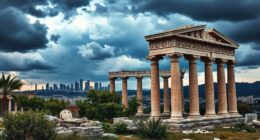To live a life free from certainty, embrace the teachings of ancient Greece. Accept unpredictability as a natural part of existence. Stoic principles encourage you to focus on what you can control and cultivate resilience through mindfulness and virtue. Epicurus reminds you to value simple pleasures and form deep connections while minimizing pain. Seek ataraxia by reflecting on your thoughts and aligning your actions with virtue. Socratic questioning helps you understand your limitations and pursue wisdom. Open yourself to these insights, and you'll discover tools for maneuvering life's uncertainties with grace and ease. There's so much more to uncover.
Key Takeaways
- Embrace unpredictability by accepting that uncertainty is an inherent part of life, fostering resilience and inner peace.
- Cultivate mindfulness and focus on controllable aspects to navigate challenges effectively and reduce anxiety.
- Engage in daily reflection to enhance self-awareness, align actions with values, and promote personal growth.
- Pursue simple pleasures and deep connections with others to attain eudaimonia, or a fulfilling life.
- Accept mortality and life's impermanence to prioritize present joy and cultivate a sense of tranquility.
Embracing Uncertainty in Life
Embracing uncertainty in life can feel intimidating, but it's an essential part of the human experience. Ancient philosophers understood this well, teaching that accepting life's unpredictability is vital for living the Good Life.
The Stoics, for instance, encouraged you to focus on what you can control, fostering resilience amidst chaos. By relinquishing your need for certainty, you can navigate challenges with a clearer mindset. This perspective aligns with the importance of emotional intelligence, which enhances your ability to manage your feelings and interactions during uncertain times.
Epicurus highlighted the importance of accepting death as a natural part of life. By confronting this reality, you free yourself from the fear of mortality, allowing you to engage fully with the present.
Similarly, the concept of ataraxia, promoted by Pyrrho and later Stoics, emphasizes achieving peace of mind by letting go of the desire for certainty.
Socratic philosophy further urges you to examine your limitations, fostering an openness to uncertainty and the complexities of existence.
Additionally, the ancient practice of consulting oracles reflects a historical acknowledgment of life's unpredictability, illustrating the significance of humility in the face of the unknown.
Ultimately, embracing uncertainty enriches your life, allowing you to find meaning and joy in the journey.
Stoicism and Resilience

You can embrace uncertainty by preparing yourself mentally and emotionally for life's unpredictability.
Stoicism teaches that by cultivating inner resilience through practices like mindfulness and virtue, you can maintain your peace amid chaos.
Additionally, understanding the importance of planning ahead, such as through advance directives, can further empower you to navigate life's uncertainties.
As you focus on what you can control, you'll find strength in your responses to challenges.
Embracing Uncertainty Through Preparedness
Steering through the complexities of life often requires recognizing that uncertainty is an inevitable part of the human experience. Embracing this uncertainty, you can draw on the principles of Stoicism to cultivate preparedness and resilience.
By distinguishing between what you can control and what you cannot, you'll find clarity in chaotic situations. This approach helps you focus your energy on proactive measures that mitigate anxiety and enhance your adaptability. Individuals grappling with emotional dysregulation, such as those with Borderline Personality Disorder, can particularly benefit from these Stoic ideals, as they emphasize managing intense emotions and fostering stability.
Preppers, especially those from liberal groups post-2016, embody these Stoic ideals. Their preparedness strategies serve as real-world examples of how to face societal uncertainties without fear.
By practicing ataraxia, or calmness, you can maintain composure even when faced with unpredictable challenges. Daily reflection, a core Stoic practice, not only strengthens your mental resilience but also aligns with modern productivity strategies.
With global uncertainties becoming more pronounced, such as during the pandemic, it's clear that Stoic principles promote a robust framework for living.
Cultivating Inner Resilience Practices
Cultivating inner resilience practices is essential for managing life's unpredictability with confidence. Stoicism teaches you to focus on what you can control and accept what you can't, helping you maintain calm amid uncertainty. By practicing daily reflection, as Seneca suggested, you enhance your self-awareness and navigate challenges with clarity.
Here are some key Stoic practices to cultivate resilience:
| Practice | Description |
|---|---|
| Daily Reflection | Assess your goals and thoughts each day. |
| Amor Fati | Embrace your circumstances, viewing obstacles as opportunities. |
| Mindfulness | Focus on the present to reduce anxiety. |
| Cultivating Virtues | Develop courage, wisdom, and temperance to respond to adversity. |
Eudaimonia: The Good Life

Eudaimonia, often referred to as "the good life," invites you to explore what it truly means to thrive. For the ancient Greeks, this concept wasn't just about feeling good; it revolved around living virtuously and fulfilling your potential. Aristotle emphasized that eudaimonia is achieved through virtuous actions and a commitment to moral character.
In contemporary society, integrating financial stability into your life can enhance your sense of security and fulfillment, with resources available for retirement planning strategies tailored to your needs.
Plato added another layer, suggesting that finding your "other half" and fostering deep connections with others is essential for true happiness. Meanwhile, Epicurus taught that simple pleasures and minimizing pain lead to eudaimonia, especially when you free yourself from the fear of death.
The Stoics, like Zeno, shifted the focus to acceptance, advocating for the embrace of what lies beyond your control. They believed that virtue and reason in your actions are key to achieving a fulfilling life.
Collectively, these ancient thinkers show you that eudaimonia isn't a static destination; it's a dynamic journey requiring continuous effort and engagement with your community. By actively pursuing virtue and meaningful connections, you set the stage for a life rich in purpose and fulfillment.
Philosophical Insights From Socrates

Exploring the good life naturally leads you to the profound insights of Socrates, whose philosophical legacy continues to resonate today.
His teachings remind you that self-knowledge is the cornerstone of a fulfilling existence. Socrates famously stated, "The unexamined life isn't worth living." This declaration encourages you to reflect deeply on your values and beliefs, much like understanding the importance of clear communication during a breakup to maintain dignity.
Here are four key insights from Socrates that invite introspection:
- Question Everything: Embrace the Socratic method to challenge your assumptions and uncover deeper truths.
- Know Thyself: Understanding your own limitations is the first step toward true wisdom.
- Virtue is Knowledge: Recognize that genuine virtue stems from understanding what's right; ignorance leads to moral failure.
- Courage in Inquiry: Socrates faced execution for seeking truth, teaching you that the pursuit of knowledge can come with risks.
The Role of Epicureanism

While life often feels chaotic and uncertain, Epicureanism offers a guiding philosophy that emphasizes the pursuit of simple pleasures and the importance of minimizing pain. This ancient thought encourages you to focus on experiences that foster true happiness, rather than chasing material wealth. By cultivating friendships and engaging in intellectual pursuits, you can align your life with your values and achieve a state of ataraxia, or serene calmness.
To better understand the key components of Epicureanism, consider the following table:
| Concept | Description | Benefit |
|---|---|---|
| Simple Pleasures | Enjoying life's basic joys | Enhances happiness |
| Acceptance of Death | Embracing mortality as a natural part of life | Reduces fear |
| Critical Examination | Differentiating between necessary and unnecessary desires | Promotes wise choices |
| Friendships | Building strong connections with others | Fosters support |
| Intellectual Pursuits | Engaging in thoughtful discussions and learning | Enriches life experience |
Lessons From Hellenistic Thinkers

Hellenistic thinkers offer valuable insights that can further enhance your understanding of steering through uncertainty. Their teachings encourage you to embrace the unpredictability of life while cultivating inner peace.
Additionally, just as the best heat pumps provide energy efficiency through advanced technology, you can optimize your life by focusing on the elements you can manage.
Here are four key lessons to remember:
- Accept what you can't control: The Stoic idea emphasizes recognizing the limits of your influence, allowing you to focus on what truly matters.
- Pursue simple pleasures: Epicurus taught that minimizing pain and understanding death can lead to a more fulfilling life, free from unnecessary fears.
- Cultivate ataraxia: This state of tranquility, central to Pyrrhonism, encourages you to suspend judgment and find peace amidst chaos.
- Align with virtue: Zeno of Citium highlighted the importance of living in harmony with nature and rational thought, guiding you through life's uncertainties.
Coping Strategies for Modern Challenges

Coping with modern challenges demands a proactive mindset and practical strategies that draw on timeless wisdom. Ancient Greek philosophy, especially Stoicism, offers invaluable insights for maneuvering through today's uncertainties.
Start by embracing the Stoic principle of distinguishing between what you can control and what you cannot. This simple yet powerful shift in perspective helps you focus your energy on actionable steps, reducing anxiety and fostering resilience. Additionally, cultivating an abundance mindset can enhance your perception of wealth and prosperity, reinforcing a sense of well-being in uncertain times.
Epicurus taught that accepting death as a natural part of life can lessen fear, allowing you to enjoy the present moment fully. Reflect on this to cultivate a mindset that prioritizes joy and fulfillment.
Aristotle's concept of eudaimonia emphasizes the importance of virtue and moral character in achieving true happiness. By committing to personal growth and ethical living, you can find deeper meaning amid life's chaos.
Incorporating reflective practices like journaling and daily self-examination will enhance your ability to think critically and adapt to challenges. These strategies not only align with Stoic teachings but also resonate with modern cognitive behavioral therapy, making ancient wisdom relevant for enhancing your mental well-being and overall quality of life.
Practical Applications of Ancient Wisdom

Ancient wisdom isn't just a relic of the past; it's a practical tool you can use today to navigate life's uncertainties. By embracing teachings from Stoicism and Epicureanism, you can cultivate self-knowledge and improve your overall well-being.
Additionally, incorporating practices like mindfulness through unplugging from technology can enhance your self-awareness and presence in the moment. Here are four ways to apply these philosophies in your daily life:
- Practice Self-Reflection: Spend time journaling your thoughts and feelings. This helps you understand your motivations and challenges, deepening your self-knowledge.
- Focus on What You Can Control: Channel Stoic principles by identifying what's within your power and letting go of what isn't. This fosters resilience in the face of adversity.
- Embrace Simple Pleasures: Inspired by Epicureanism, prioritize activities that bring you genuine joy. This can reduce anxiety and improve your quality of life.
- Accept Life's Impermanence: Acknowledge that uncertainty is a natural part of life. By accepting this, you can cultivate a sense of calm and perspective.
Implementing these practical applications of ancient wisdom can empower you to live a more fulfilling, resilient life amidst uncertainty.
Frequently Asked Questions
What Were the Ways of Life in Ancient Greece?
In Ancient Greece, you'd engage in community governance, embrace philosophical teachings, participate in religious rituals, celebrate athletic competitions, and pursue education in rhetoric and physical training, all fostering a fulfilling and interconnected way of life.
In What Ways Are the Ideas of Ancient Greece Still Alive Today?
Ancient ideas inspire and influence. You'll find echoes of Greek thought in modern ethics, education, and emotional resilience. Embracing community, questioning reality, and cultivating virtue shape your path toward happiness and fulfillment today.
How Were the Ancient Greeks Supposed to Live Their Lives?
The ancient Greeks believed you should live a virtuous life, embracing hard work and wisdom. You're encouraged to accept uncertainties, focus on what you can control, and seek guidance from both reason and divine insights.
What Did the Ancient Greeks Believe About Life?
You'll find that the ancient Greeks embraced life's delightful unpredictability, believing it is crucial to toil through joys and challenges. They valued knowledge, virtue, and simple pleasures, accepting uncertainty as a natural part of existence.
Conclusion
Living a life free from certainty can feel like sailing on a vast ocean, where the winds of change guide your journey. By embracing uncertainty, you open yourself up to the wisdom of ancient Greece, drawing strength from Stoicism and finding joy in the present through Epicureanism. Just as Hellenistic thinkers faced life's unpredictability, you too can cultivate resilience and thrive. So, let go of rigid expectations and navigate life's waves with an open heart and mind.









